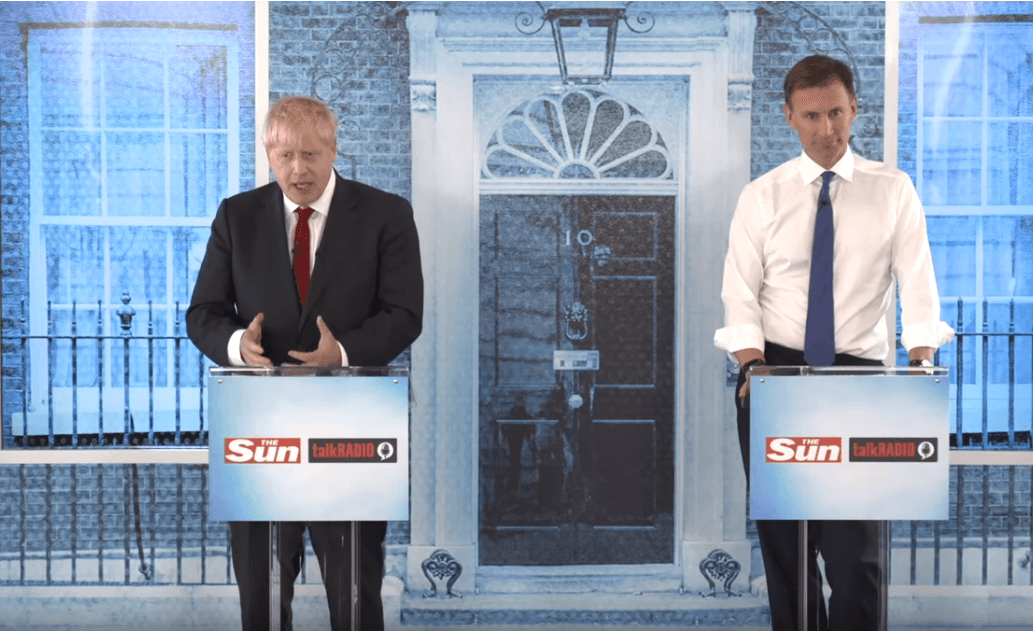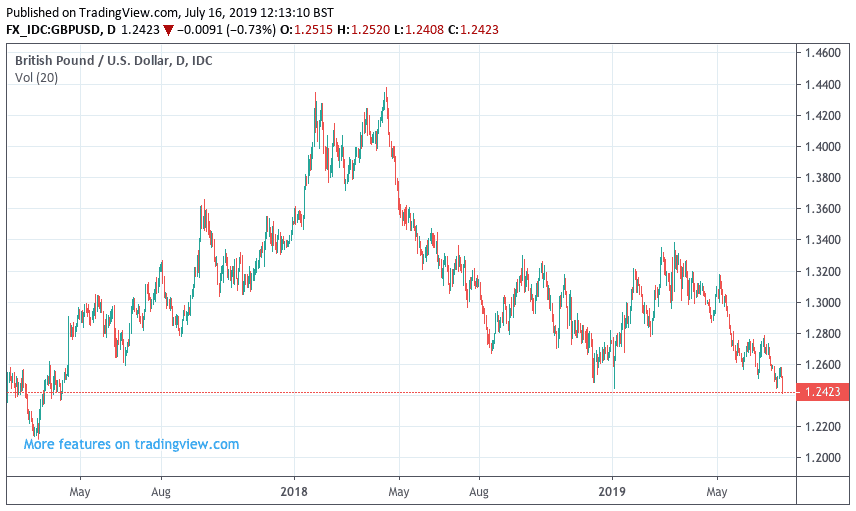Sterling in Sharp Slump on Johnson and Hunt Irish Backstop Rejection

Image copyright Pound Sterling Live, still courtesy of The Sun.
- Snapshot: GBP/EUR: 1.1066 -0.40% | GBP/USD:1.2411 -0.85%
- Johnson, Hunt fully reject Irish backstop
- EU said to prepare 'sweeteners' to make deal acceptable
- UK wage data in focus mid-morning
The British Pound plumbed fresh two-year lows against the U.S. Dollar and approach fresh 2019 lows against the Euro as it appears the UK and EU are almost certain to part ways without a deal on October 31.
Expectations for a 'no deal' Brexit were lifted on Tuesday afternoon on reports Boris Johnson's campaign team was considering ways of how to bypass parliament in order to deliver a Brexit at all costs.
According to Sky News, Johnson could seek to suspend Parliament for two weeks in October with members of his campaign saying the incoming Prime Minister would look to schedule a Queen's Speech to mark the start of a new parliamentary session in early November.
Parliament is usually 'out of session' for between one and two weeks ahead of a Queen's speech, meaning MPs would in effect be unavailable to stop a no-deal Brexit immediately before October 31.
The reports suggest to currency markets that Johnson is serious about a 'no deal' Brexit and this represents the first time that a clear strategy to achieving such an outcome has been aired.
"Make no mistake, this decline in the Pound is down to traders pricing in a higher chance of a no-deal exit," says Neil Wilson, Chief Market Analyst at Markets.com. "Sterling has crashed below its flash crash lows to trade at its weakest in two years. The tougher stance from both Boris Johnson and Jeremy Hunt in terms of their rhetoric on Brexit is clearly weighing on the pound."
Ahead of the report, Sterling was already under seige following a commitment from both Johnson and fellow leadership contender Jeremy Hunt that they would bin the so-called Northern Irish backstop.
Appearing before the cameras in the final debate of the Conservative Party leadership campaign, both Johnson and Hunt said they would not accept a five-year time limit, or a unilateral exit clause, as sweeteners that would see them accept the backstop.
Recall, it is the Northern Irish backstop clause contained in the EU-UK Brexit deal that has drawn fierce opposition from UK parliamentarians who say it could leave the UK perpetually tied into the EU's orbit if it is ever triggered.
There were suggestions that were a time-limit, or unilateral exit clause, added to the backstop then it could make the deal more palatable to opponents.
Asked during the debate - hosted by The Sun and TalkRadio - whether the backstop would be acceptable if a time limit could be agreed, Johnson said:
"I'm not attracted to time limits or unilateral escape hatches or all these elaborate devices, glosses, codicils and so on that you could apply to the backstop."
Hunt said: "the backstop, as it is, is dead ... I don't think tweaking it with a time limit will do the trick, we've got to find a new way."
That both Hunt and Johnson are now apparently rejecting the backstop in its entirety sends a signal to markets that the UK is on course for a 'no deal' exit, even if both candidates say they still want to find a negotiated settlement on the matter.
Interestingly, the position on the backstop means the two candidates are now adopting a stance on Brexit that is potentially more uncompromising than that of Dominic Raab, the former candidate who had been widely acknowledged to have had the toughest line on the Brexit deal.
The Pound declined "after both Prime Ministerial candidate’s Boris Johnson and Jeremy Hunt said the Irish backstop has to be abolished. Presumably, this would be the ”proposal” in any new deal presented to the EU," says Richard Grace, a currency strategist with CBA. "The implications are that the chances of a no‑deal hard Brexit have lifted or Northern Ireland remains with EU rules."
Barclay Leaves Barnier Dismayed
The developments amidst media reports this morning saying that a meeting between chief UK and EU Brexit negotiators last week was one of the most difficult encounters of the last three years, according to European officials.
"Brussels is preparing for “brutal” talks with the next prime minister after the Brexit secretary told Michel Barnier five times during a bad-tempered meeting that the withdrawal agreement was dead," said Bruno Waterfield, at the Times, in a report out Tuesday.
According to the report, Brexit Secretary Stephen Barclay left the EU's lead negotiator Michel Barnier, "astonished and dismayed" during a “confrontational” exchange last Tuesday.
“He told Barnier that the withdrawal agreement was dead — not once but five times,” a senior EU diplomat told the Times. “If this is what is coming then we will be heading for no deal very quickly.”
We have seen Sterling decline when 'no deal' odds rise, and at present the Pound-to-Euro exchange rate is testing a key support level at 1.11: as we note here, if it breaks a quick move lower could transpire, but if it holds a recovery might build.
Today will be an important day for this exchange rate as it appears to be breaking down, but we can only say the level has been broken based on where the daily close is.
The Pound-to-Dollar exchange rate is meanwhile flirting with 1.25 at the time of writing, the 2019 low is at 1.2440.
"GBP is clearly vulnerable against a backdrop of political uncertainty and a deteriorating UK economic environment," says Jane Foley, a foreign exchange strategist with Rabobank. "The Brexit outcome and politics developments remain the largest driving factor for GBP."
Time to move your money? Get 3-5% more currency than your bank would offer by using the services of foreign exchange specialists at RationalFX. A specialist broker can deliver you an exchange rate closer to the real market rate, thereby saving you substantial quantities of currency. Find out more here.
* Advertisement
Strong Wage Data Offers Little Respite
If ever there were an indication of just how negative sentiment towards the British Pound really is, then today's reaction to some impressive labour market data is it.
Official data from the ONS shows a strong pick up in wages, yet the Pound failed to bat an eyelid at the data and remains under notable selling pressure, with markets retaining a lazer-eye focus on political developments and a potential 'no deal' Brexit.
The ONS reports that UK wages, with bonuses included, rose 3.4% in May which is well ahead of the 3.1% forecast by markets. Rising wages are important for the Pound as they tends to foreshadow changes in inflation: rising wages tends to lead to rising inflation, and this would typically elicit an interest rate rise at the Bank of England.
Rising interest rates tend to put a lid on inflation, and a side effect of higher interest rates are capital inflows that boost the currency.
"This morning’s labour data smashed expectations, with unemployment rates maintaining their historical lows whilst wage growth figures continued to outstrip inflation. However, the Pound cannot catch a break at the moment," says Hamish Muress, Senior Currency Strategist at OFX. “Under normal circumstances, positive labour data such as this would bolster the Pound, particularly given it is currently seen by many as undervalued. However, these are not normal circumstances that the Pound is trading under."
Today's numbers should be all-out Sterling positive, but instead we see the Pound-Euro exchange rate hitting a fresh seven-month low while the Pound-Dollar exchange rate is hitting fresh two-year lows.
Breaking down: You would have to go back to April 2017 for a discount on Sterling-Dollar similar to that seen today.





